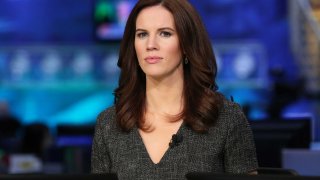
The Fed is about to hike interest rates once again tomorrow. But the market is already betting they'll be doing rate cuts before too long.
In fact, the reason why stocks are down this morning and yields are up is because of "fears of a hawkish Powell" at the Fed's press conference tomorrow, as Andrew Brenner at Natalliance observed this morning. The market knows two things right now: one, that Powell won't back down from more rate hikes, because he's afraid of repeating the sins of central bankers past. And two, that he will nevertheless be forced to, because the economy is slowing sharply and several recession indicators have already peaked.
"We think he will be done raising rates after Wednesday, but he doesn't know that yet," Brenner wrote, echoing much of the market right now. Indeed, the Fed is very bad at predicting its own rate moves. A year ago this time officials thought they would hike rates to just 1% by year-end. It turned out, they had to jack rates all the way up over 4%. Their poor predictive track record, which results from a desire to not be "bossed around" by markets, is extra unfortunate given that their actions influence the real economy with a 12-18 month lag.
"Our longer-term view is simple...The Fed will ease this year no matter how much they tell you they won't," Brenner says, and he's not the only one betting on that.
Get Tri-state area news and weather forecasts to your inbox. Sign up for NBC New York newsletters.
"Historically, the Fed has started a new rate-easing cycle an average of nine months after the last rate hike," noted Sam Stovall of CFRA this morning. That means the Fed, he said, is likely to start cutting rates by the end of 2023, or early 2024. And what happens to stocks in the meantime, between the last hike and the first cut? You guessed it--they rally. In fact, 99% of the S&P 1500--an extremely broad universe--is typically higher, with financials and real estate leading the way, and energy and materials posting the smallest gains.
Which is exactly why we're already seeing stocks rise this year--because investors are racing ahead and starting to price in not just the Fed "pause," but outright Fed rate cuts that are likely looming. Indeed, the market's 6% rally since January 1 has been incredibly broad, just as you'd expect based on this history, Stovall writes.
If only the story ended there, you could rush out and start buying stocks hand over fist. But beware: savvy investors are selling these rallies, or using them as exit points, because they expect the market to ultimately weaken again as recession sets in. That is exactly the advice, based on past examples, that Michael Darda of MKM Partners is giving. And for those thinking, after solid earnings from the likes of Visa and American Express last week, well, corporate America ain't seeing recession, Darda notes that we are also currently seeing a "bear market divergence" between high corporate operating earnings and lower economywide profits.
Money Report
Anytime this divergence has been above 25%, as it is now, he notes, we have had bear markets. Plus, corporate America itself is often a lagging indicator, as I noted last week. Visa, for instance, was saying "at this time we see no discernible trend of a softer U.S. economy meaningfully affecting our payment volumes," as late as April of 2008! The economy had already been in recession for five months at that point!
So it's unfortunate that with both the Fed decision and the slew of earnings we are going to get this week, you'll hear officials talking about one reality, while the market is already pricing in something very, very different looming on the horizon.
See you at 1 p.m!
Kelly






